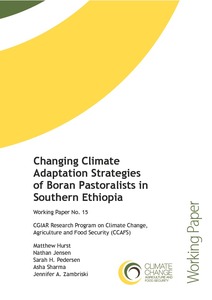Resource information
This report contains information on a rapid field assessment of Boran pastoralists of southern
Ethiopia to: (1) gauge local communities’ perceptions of the need for local climate change
adaptation strategies and their degree of satisfaction with existing interventions; (2) identify
emerging climate risk adaptation strategies; and (3) evaluate how existing and new strategies
including efforts by non-governmental organizations and the Ethiopian government might
complement or be compromised by index-based livestock insurance (IBLI).
Researchers found that the Boran perceive changes in the frequency and intensity of drought
conditions over the last several decades. The Boran also recognize the need to adapt to these
shifts, and along with the government and NGOs who work in the region, are undertaking a
number of climate change adaptation strategies. Some of these traditional and new responses
to drought are likely to interact with the potential implementation of IBLI in both
complementary and conflicting ways. Still, there are significant opportunities for IBLI to
reduce exposure to risk while supporting existing veterinary services and rangeland
management.


